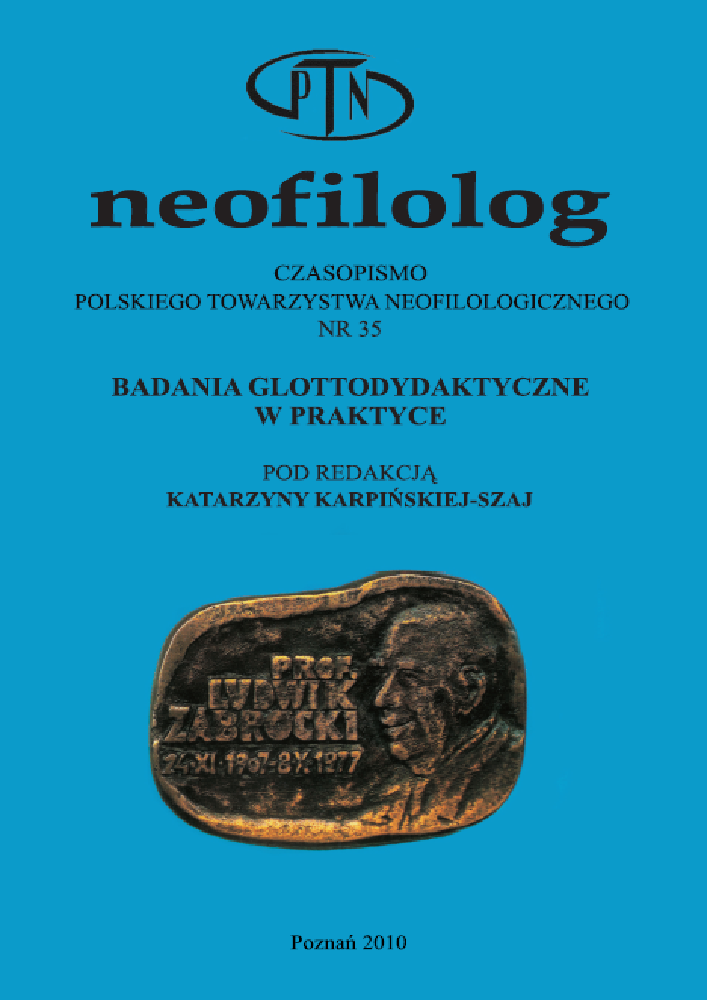Abstract
The aim of the article is to present the role of translation exercises during foreign language lessons. On the basis of the questionnaire research conducted at a secondary school, the author tries to prove that those scholars who claim that translation exercises should not be used during foreign language lessons are wrong. Although the grammar translation method, which treated translation as a precondition for mastering a foreign language, was harshly criticised, it is now clear that the mother tongue – and hence translation – plays a significant part in the foreign language acquisition process. My empirical research also confirms that teachers often return to translation exercises during foreign language lessons.
References
Butzkamm, W. i Eschbach, S. 1985. „Prinzip der Einsprachigkeit/Rolle der Muttersprache”. (w) Donnerstag, J. i Knapp-Potthoff, A. (red.) Kongressdokumentation der 10. Arbeitstagung der Fremdsprachendidaktiker. Tübingen: Gunter Narr Verlag: 133-142.
Edmondson, W. i House, J. 2006. Einführung in die Sprachlehrforschung. Tübingen: Francke Verlag, 3. Auflage.
Hönig, G. i Kußmaul, P. 1991. Strategie der Übersetzung: Ein Lehr- und Arbeitsbuch. Tübingen: Gunter Narr Verlag.
Hufeisen, B. i Neuner, G. 2000. Angewandte Linguistik für den fremdsprachlichen Deutschunterricht. Fernstudieneinheit 16. Berlin: Langenscheidt.
Iluk, J. 2008. „Tłumaczyć czy nie tłumaczyć na lekcjach języka obcego”. (w) Języki Obce w Szkole 5: 32-41.
Kautz, U. 2000. Handbuch Didaktik des Übersetzens und Dolmetschens. München: iudicium.
Königs, F.-G. 2000. „Übersetzen im Deutschunterricht? Ja, aber anders!”. (w) Fremdsprache Deutsch. Heft 23: 6-13.
Löschmann, M. 1993. Effiziente Wortschatzarbeit: Alte und neue Wege. Frankfurt/Main: Peter Lang.
Nord, Ch. 1999. Fertigkeit Übersetzen. Fernstudieneinheit 39 (Erprobungsfassung 7/99). Berlin: Langenscheidt.
Nowak, E. 2000. „Einsprachig? – Zweisprachig? Übersetzen als Mittel der Semantisierung von Wortschatz”. (w) Fremdsprache Deutsch. Heft 23: 14-18.
Rösler, D. 2000. „Kooperativ statt lehrerzentriert! Ein Beispiel für den kooperativen Übersetzungsunterricht”. (w) Fremdsprache Deutsch. Heft 23: 19-24.
Targońska, J. 2007. „Miejsce tłumaczenia na lekcji języka niemieckiego na początku XXI wieku”. Neofilolog 30: 69-77.
Tomaszkiewicz, T. 1983. „Zastosowanie przekładu w procesie nauczania”. (w) Języki Obce w Szkole 3: 167-173.
Żmudzki, J. 2008. „Das Problem des Übersetzens im Deutschunterricht. Fortsetzung einer Diskussion”. (w) Janoszczyk, J., Krzysiak, L. i Żmudzki, J. (red.), Deutsch lernen und lehren mit Lehrwerken. Vergangenheit. Gegenwart. Zukunft. Lublin: Wydawnictwo UMCS: 99-112.
License
Copyright (c) 2010 Artur Dariusz Kubacki

This work is licensed under a Creative Commons Attribution-NoDerivatives 4.0 International License.
Authors
Authors of texts accepted for publication in Neofilolog are required to complete, sign and return to the Editorial team’s office the Agreement for granting a royalty-free license to works with a commitment to grant a CC sub-license.
Under the agreement, the authors of the texts published in Neofilolog grant Adam Mickiewicz University in Poznań a non-exclusive, royalty-free license and authorize the use of Attribution-NoDerivatives 4.0 International (CC BY-ND 4.0) Creative Commons sub-license.
The authors retain the right to the free disposal of the work.
Users
Interested Internet users are entitled to use works that have been published in Neofilolog since 2017, under the following conditions:
▪ attribution – obligation to provide, together with the distributed work, information about the authorship, title, source (link to the original work, DOI) and the license itself.
▪ no derivatives – the work must be preserved in its original form. Without the author's consent, it is not possible to distribute the modified work in the form of translations, publications, etc.
Copyrights are reserved for all texts published since 2017.
Miscellaneous
Adam Mickiewicz University in Poznań retains the property right as a whole (layout, graphic form, title, cover design, logo etc.).
